Preview: Charley's Aunt, Skyline High School
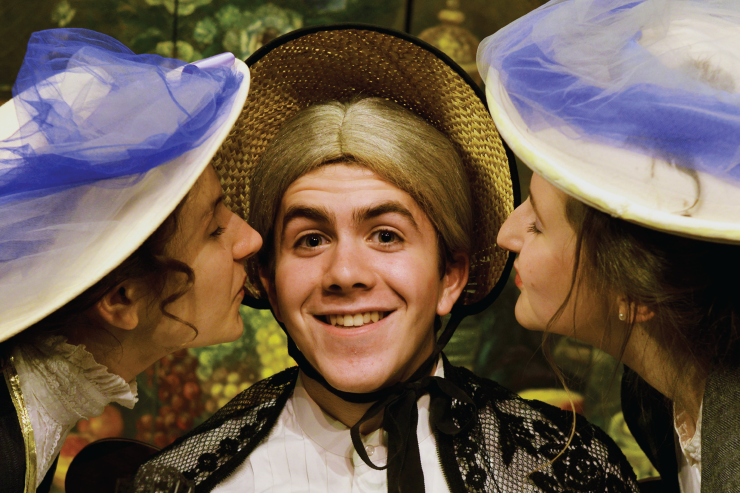
This weekend, Skyline High School Theatre presents Charley's Aunt.
Long before Tootsie or Mrs. Doubtfire - 122 years ago, in fact - the cross-dressing comedy Charley’s Aunt has been keeping audiences in stitches. Playwright Brandon Thomas wrote this British farce about a couple college buddies who rope a third friend into dressing up as an elderly aunt/chaperone for their girlfriends. They hope “she” will be a more reasonable alternative to the girls’ over-protective and overbearing male guardian...but of course it turns out to be a little more complicated than that.
“Charley's Aunt is the quintessential British farce,” says director Anne-Marie Roberts, explaining that the show isn’t just entertaining for the audience, it’s also educational for the participants. “Exposing the students to a gem of the British theater is one of the goals for educational theater.”
Skyline's production features Jianmarco Barbeau and Jakub Hann as the college friends; Leah Bauer and Amanda Wilhoit as the girlfriends; Riley O'Brian as the guardian; and Theo Billups as "Charley's Aunt". Rounding out the cast are Peter Dannug as Sir Fancis; Madison Burk as wealthy widow Donna Lucia De Alvadorez; Sonja Mittlestat as her young ward Ela; and Luke Wertenberger as Jack's put-upon butler, Brasset.
Amy Cantú is a Production Librarian at the Ann Arbor District Library.
Charley’s Aunt runs March 17,18, and 19 at Skyline High School Auditorium at 7:30 pm each night. Tickets are available at www.showtix4u.com for $8 for adults and $6 for students and seniors. Tickets will also be available at the door for $10 for adults and $8 for students and seniors.
Preview: Warren's Peace, Saline Area Players
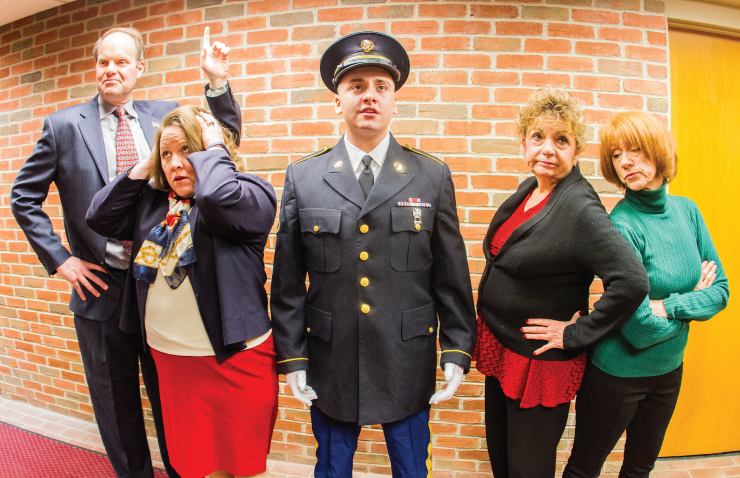
Enjoy an evening of theater set in Michigan, written by Michigan playwrights--that also promises audience samples of Michigan-made treats from local providers like Ed's Bread, Grand Traverse Pie, and Zingerman's--when the Saline Area Players present Marc and Kathy Holland’s new comedy Warren’s Peace.
The production may seem to be an appreciation of all things Michigan, but the underlying purpose is to delight and amuse. As playwright and director Marc Holland stated in a recent interview “I want you to have a good time when you attend my show, just as I want to laugh when I lay down my money at the box office.”
Warren’s Peace centers on a national guardsman who is sent to a small Michigan town to kick off World Peace Day, but runs into conflict when he meets the distrustful, eccentric townspeople. Andrew Godell plays the guardsman, and the cast includes Brent Lofgren, Trevor Maher, Patti Ringe, Marlena Shuler, and (of special interest to library fans) Laurie Atwood as the Librarian.
Tim Grimes is manager of Community Relations & Marketing at the Ann Arbor District Library and co-founder of Redbud Productions.
Performances of Warren’s Peace run Thursday-Saturday, March 17-19, and will take place at Fifth Corner, 211 Willis Rd in Saline. For information, visit http://salineareaplayers.org.
Q&A with 54th Ann Arbor Film Festival Executive Director Leslie Raymond
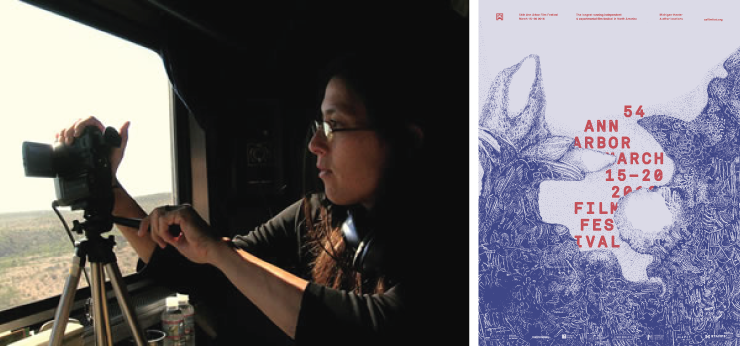
I recently stopped by the busy Ann Arbor Film Festival office to chat with Leslie Raymond about the upcoming 54th Ann Arbor Film Festival running March 15-20, 2016. Leslie has been involved with the AAFF since the 30th Festival in 1992; this will be her third year as the Festival’s Executive Director.
Q: What’s new or different about this year’s Festival?
A: Well, we’re seeing a lot of animation. We’re also seeing a lot of feature length documentaries, nine or ten of which are in competition, as well as three films by Chantal Akerman who passed away tragically last October. We felt she was such an important figure in the history of avant-garde cinema as well as a great role model for women.
Q: Why do you think there are more documentaries this year?
A: Yeah, David [Dinnell, program director] and I were talking earlier about this being a more “moving image” culture where so much of the information we receive now comes through the moving image because of its ubiquity. Now we can shoot a movie on our cellphone, edit it, and publish it in minutes. Maybe that has something to do with it, although I don’t know why that would draw somebody more to making something more documentary than narrative.
Q: Which of the Festival events excite you the most this year?
A: Grahame Weinbren’s 78 Letters - which will show on Sunday, March 20 at 3:15 pm in the Main Auditorium - is an interactive series of one-minute pieces where the audience will help direct how the work goes together. I’m particularly excited about that. There will also be a 1975 installation by Lis Rhodes at the Ann Arbor Art Center on Friday, March 18 from 3 to 5 pm. It’s titled Light Music and it’s composed of two 16 mm projectors projecting abstract imagery from either end of the viewing space with an optical soundtrack read by light passing through. We’re also excited about the live shadow puppet performance by local artist Tom Carey that opens the “Films in Competition 5 (Ages 6+)” event. We call it “family friendly” and “ages 6 and up” but it’s not just a “kid’s show.” One of the things important for us is to engage audiences on other levels than just being a passive observer.
Q: Do you think audiences are more receptive today to an interactive experience?
A: I think so. And we want to provide opportunities for Festival viewers to be part of the fabric of the environment. Along these lines we have the “What We Saw” cards in the lobby -- we’ve done this for several years now -- where we invite participants to fill the cards out, let us know what they think about what they’ve just seen, and then take pictures of them for a slide show. There will even be an Oculus Rift piece in the grand foyer of the Michigan Theater -- a 9-foot inflatable bubble! -- where people will be able to put on the Oculus Rift and have an 8 or 9-minute Oculus Rift experience.
Q: I know someone who’s coming to the festival for the first time. What do you want her to take away from the experience?
A: We’d want her to feel the empowerment of seeing a lot of different things about the world. I think there’s so much to be said for being able to access all of these different viewpoints and ways of expressing things that go far outside the mainstream culture. We’d want her to experience the richness and diversity we live in. So I’d hope that somebody coming for the first time would see things they’re not familiar with...and be okay with that.
Q: The legacy of the AAFF as the longest-running independent and experimental festival in North America is an honor for Ann Arbor. Do you feel a sense of responsibility that Festival goers leave with a sense of that history?
A: I do think about it a lot. I feel like it’s a huge responsibility. The Festival has been here since 1963 and it still embodies the ethos in which it was founded - that particular time and place in history where there was such a rich political, social, and even fashion culture in every direction you looked. I think this heritage ties directly into the diversity of independent cinematic voices and our embracing of that diversity of expressions. It’s still relevant. So I think it’s important to stay grounded in the Festival’s history while also moving toward the future using the technologies that will now allow for much more of this experimentation.
Q: Any final thoughts on this year’s Festival?
A: I’ve been thinking lately about the sense of the collective journey. For a lot of people who are invested in joining us for the whole week – or even if you’re only coming to a few programs – there really is a sense of embarking on something unknown with a spirit of adventure. There are all kinds of things to discover, conversations to be had, thoughts to be thought, and feelings to be felt. Part of it is looking at the work and having the opportunity to share it with those you came with or walk out of the screening and then run into someone in the lobby and talk about what you’ve just experienced.
Amy Cantú is a Production Librarian at AADL.
The Ann Arbor Film Festival runs from March 15-20, 2016. Tickets are available at the door or online.
Preview: Nufonia Must Fall
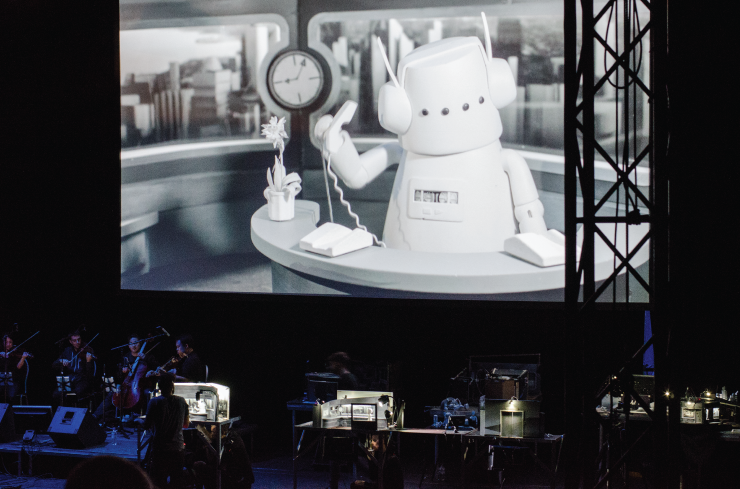
If the combination of puppets, moody robots, and quiet romance – all accompanied by a pop culture-inspired string quartet, moving fluidly from synth to pop to jazz – sounds intriguing and magical, then you need to go see Nufonia Must Fall.
Nufonia Must Fall is based on a nearly-wordless graphic novel published in 2003 by Kid Koala, a D.J., producer, composer, and studio contributor for the band Gorillaz, based in Montreal. As evidenced by his artistic output, Kid Koala, is comfortable in a wildly idiosyncratic, exciting, and whimsical world of raw beats and emotionally-charged stories. Sadly, the graphic novel is out of print, but this live performance uses mixed media to bring the story to life in ways the book alone never could.
The story takes place in Nufonia, a drab, monochromatic place, where T4, a robot, falls in love with a customer at the sandwich shop where he works – after having been fired and replaced by a newer model robot at his old job. The customer reciprocates T4's love and a romance unfolds. The adorable puppets are all white and stand about 10 inches tall. The simple intimacy of the story draws you in and holds you as the highs and lows of their romance play out.
All of the action is projected on a large screen, as the action takes place on a stage of shoebox-sized sets. It’s thrilling to watch the shadowy shapes of the puppeteers create the action in real time – offering up the skin-tingling sensation that only a live performance can evoke.
Kid Koala has said that "Nufonia" is derived from “no fun,” and for those who live there, “what’s going on in their mind gets in the way of having fun.”
Abandon any preconceived notions you may have about puppets, robot love, or marsupial DJs, and come out for a moving and magical evening of unusual storytelling.
Erin Helmrich is a Production Librarian at the Ann Arbor District Library, a fan of the Gorillaz, graphic novels, and adorable stuff in all forms.
"Nufonia Must Fall" runs Friday, March 10 and Saturday, March 11 at 8 pm at The Power Center. The performance is presented by UMS as part of the International Theater Series UMS on Film.
Preview: Voices of the Middle West Literary Festival

Now in its third year, the Voices of the Middle West literary festival will take place on Saturday, March 12 at the University of Michigan’s Residential College. It’s free and open to the public.
The event includes a book fair, panels with authors and publishers, an open mic, and a keynote by poet and 2015 National Book Award finalist Ross Gay. On Friday, March 11, there’ll be a kick-off reading at Literati Bookstore, featuring Ross Gay along with Fred Arroyo, Peter Geye, Emily Schultz, and Amber Sparks.
The festival was founded by Robert James Russell and Jeff Pfaller, having worked together on the literary journal Midwestern Gothic. To make Voices of the Middle West happen, they work together with co-organizer and co-curator Laura Thomas at the Residential College.
As an editor at Joyland Magazine, I've participated in the book fair, and this year, you can also find me at the festival chatting up the UMS Artists in Residence program. I gave Rob a call to chat about the festival.
Q: I want to get your founder/curator view of things. Can you tell me how the festival first came together?
A: Yes, so, Jeff Pfaller and I were always looking to do more with Midwestern Gothic. We always wanted to do more, and legitimately, we love the writing community. So we tossed around ideas for a long time, and we came up with Voices.
It’s a totally free event, and we’re doing it purely as a way to get the community together. Personally, I don’t really view writing as a solitary thing. I mean, the actual writing itself is a very small part of the writing process. I think most writers really are social. They want to be together, talk about books and talk about writing.
I go to the Association of Writers & Writing Programs conference every year, and I really like it, but it’s really expensive, and I recognize that not everyone can do that. We wanted to make Voices accessible to those who can’t go to bigger, expensive conferences and festivals.
At the time we already had a working relationship with U-M’s Residential College, where I also teach, and we kind of approached them and said, hey, we have this idea for this, would you be interested? It turned out they were looking to do something like the festival already, and it worked out well.
The RC’s Laura Thomas, our co-organizer and co-curator, she’s fantastic. You know, there a lot of moving parts to this, and let’s just say that with Laura’s help, it’s been easier to put together than it should be.
Q: I like that. How big has the festival been?
A: So, last year our foot traffic was about 2,500 throughout the day. We’re hoping for at least a 10% increase in that.
Q: How has the festival changed year to year for you?
A: I would say coverage, and you know, awareness that we exist now. Quite frankly, we have put on two pretty awesome festivals. Our first year keynote was Curtis Sittenfeld. She is great. Last year we had Stuart Dybek. And this year we have the poet Ross Gay.
This year we have some people driving up from Missouri, people who are driving over from Minnesota, to experience the festival. That's the biggest honor I could ever have.
Q: What would you recommend to a newbie to the festival?
A: I would say, spend the whole day, because we have panels all day with really fantastic, captivating, exciting authors.
But I would also recommend spending a lot of time in the book fair, which I think is unique in that we do get a good crowd, but you can also actually have one-on-one time with the authors and the publishers, and they actually want this to happen. I think at bigger festivals like AWP, it’s very hard to do that.
Q: So, this is maybe like a pick your favorite child question?
A: Yes. I guess my final answer is: Pick a couple panels that you're really excited about, and then spend the rest of the time at the book fair.
Q: And is there anything you are particularly looking forward to yourself this year?
A: Ross Gay's keynote I think is going to be incredible. He was just shortlisted for a National Book Award for poetry last year. I had the pleasure of being on faculty alongside him at a writing retreat last year, and I had read some of his work before, but I had never seen him read in person. When I saw him read, I said, "We have to get this guy". Because he is the most dynamic, the most electric reader I have ever seen. That is not hyperbole, he is fantastic.
People will be utterly transfixed. We are having a kick-off reading Friday night at Literati, and he is going to be reading there. Saturday’s keynote will really be about the craft of writing. I would say both of those things you can’t miss.
Q: Awesome. Anything else you want to make sure is in this preview?
A: That it’s free. [laughs] My own official motto this year has been: If you are remotely in the area and you are a writer or a reader, you should come to this.
Anna Prushinskaya is a writer based in Ann Arbor, Michigan.
The Voices of the Middle West Festival is on Saturday, March 12. The event schedule, presenters, and list of exhibitors are available at www.midwestgothic.com.
Review: Folk Musician Chris Buhalis - New Album Release Show

Local folk musician Chris Buhalis says that his newest album Big Car Town, coming out March 11, is very Detroit-focused. “You’re never sure how well that’s going to go over in some places,” he joked to attendees at a small concert in an Ypsilanti home last month. Buhalis was born on the east side of Detroit in 1969 and, though his music has taken him all over the country, he’s always returned home to Michigan.
Buhalis is a master of evoking the feel of a place in his songs, and those familiar with Michigan will connect deeply with many of the tracks on his new record. The title track talks of Buhalis’s experiences growing up in Detroit. I loved the line in the chorus “Jesus saves, and Gordie Howe gets the rebound,” which Buhalis remembers seeing spray painted in giant letters on the backside of Olympia Stadium before it was demolished.
Buhalis doesn’t just sing about Michigan, though. One of the privileges of seeing him in such a small and casual venue was that he was able to talk intimately and at length with the audience. He talked after every song, sharing stories about his life now and about experiences he had in the past, tying it all back in eventually to the next song that he was going to play. For example, when he was driving to the Boundary Waters between Minnesota and Canada years ago, Buhalis said that he saw the same truck pass him three times on a long stretch of lonely road. That truck driver was the inspiration for one of the songs. Buhalis also told us the story behind the song “Whiskey Six,” which he performed as well. He read about the men who, during the Prohibition Era, would drive their Model Ts back and forth across the frozen Detroit River, transporting alcohol from Canada to the United States. These cars were known as “whiskey sixes,” and Buhalis was so fascinated by the concept that he had to write a song about it.
Buhalis also covered three Woody Guthrie songs, the last one—“This Land is Your Land”—by request from the audience. I was thrilled to hear him cover Bruce Springsteen, too; he played “Two Hearts” and told us that he couldn’t wait to see Bruce on his upcoming The River tour -Buhalis has already seen him multiple times, and said he wouldn’t miss it.
The Big Car Town release will be accompanied by a show at The Ark on March 11. Buhalis will be joined at the show by Jeff Plankenhorm, Dominic John Davis, and Michael Shimmin, all of whom played on the record.
Elizabeth Pearce is a Library Technician at AADL and shares Buhalis' love of The Boss.
The March 11 show at The Ark starts at 8 pm and doors are at 7:30. Tickets are $15. Visit The Ark’s website for more information.
PREVIEW: The 54th Ann Arbor Film Festival
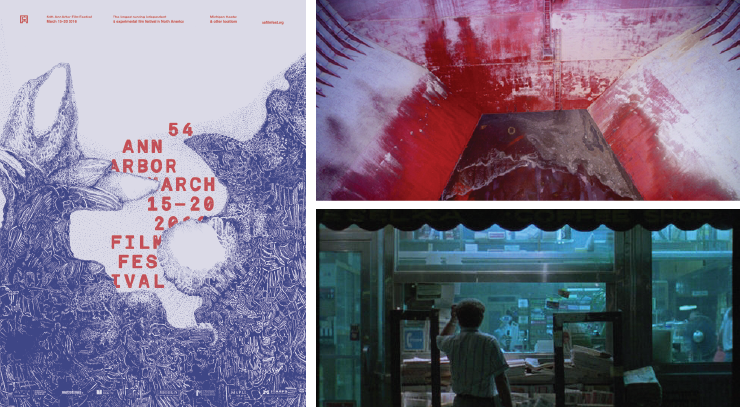
Let’s get this out of the way before we dive into some movie recommendations. The Ann Arbor Film Festival, started in 1963, is one of the longest-running film festivals in the world. In my opinion (and many others), it’s also America’s original independent film festival.
The AAFF is a forum for films made by independent artists, not commercial studios. The festival’s focus is on shorter pieces that strongly showcase what’s possible within the art form of film. The range of what you can experience over six days of cinema is extraordinary. And there’s truly something for everyone. So let’s get to it!
This year’s AAFF brings back a handful of audience favorite themed programs, including the Family-Friendly screening, Out Night with LGBTQ-oriented films, Animated Short Films, a Regional showcase, and Music Videos. There’s also an Interactive Cinema program added this year, 78 Letters, with pioneering artist Grahame Weinbren presenting a series of 1-minute shorts with the sequence determined by the audience.
The heart of the AAFF is the Films in Competition programs, which are usually an assortment of newly created shorts including animation, documentary, adventurous narratives and experimental (not plot-driven). These often contain the most memorable, confounding, polarizing pieces of the week, so if you’re feeling open-minded, I recommend choosing ones that work within your schedule.
If you’re new to the AAFF or only have time to attend one program, I recommend the Opening Night Screening of short films. Better yet, show up earlier (6 pm), pay a bit extra, and make a great evening of it by attending the Opening Night Reception. It's a stylish scene that includes food, drink, and music in the Michigan Theater’s grand foyer.
If you’re an AAFF regular, you’re likely debating how you’re going to choose from the new films in competition vs. the special programs. Highlights this year include Chantal Ackerman tribute programs (AADL has some of her works on DVD, btw), the Jem Cohen feature and shorts program (he’ll be making a rare festival appearance), a program of restored 16mm prints by underground film legend and provocateur Curt McDowell, and Northern Lights, a live cinema performance with five 16mm projectors.
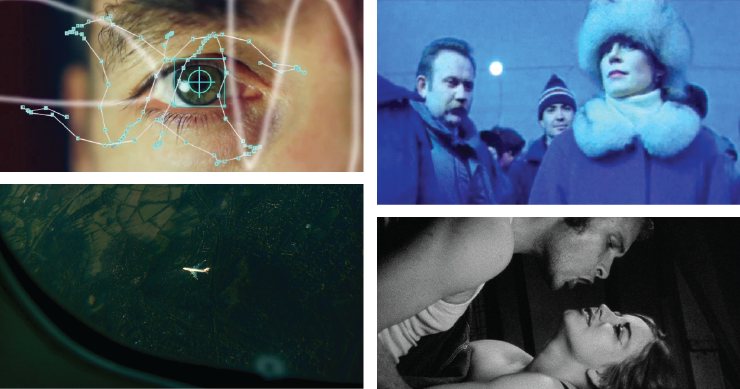
For fans of feature documentary and story-based films, The Host will provide a powerful examination that cuts across a century of personal and political history. Also screening on Saturday, two other feature films, time/OUT OF JOINT and Dead Slow Ahead, take the viewer on unexpected journeys through the time and space of unexplored territories.
The week of the AAFF additionally includes a number of excellent free events, including animator David OReilly giving a Penny Stamps lecture, sound artist Ernst Karel’s collaborative Work Gallery installation, the Expanding Frames student-oriented programs, performances (including a dual 16mm projector showing of Light Music by Lis Rhodes!), and lively afterparties every night.
“Each program is different.” You will find this simple statement on this year’s schedule. It’s also appeared on many AAFF programs dating back to the 1960s (including the original from 1963, which can be viewed in the AADL’s digital AAFF archive). And it couldn’t be more apropos for this festival of independent, artist-driven, experimental film. For one week of the year, the AAFF gives us an opportunity to explore just how vastly different cinema can be. See you there!
Donald Harrison was AAFF Executive Director 2008 - 2012 and currently runs 7 Cylinders Studio, producing compelling, content-driven videos.
The 54th Ann Arbor Film Festival runs from March 15-20, 2016 and tickets are available now. The full schedule and calendar are available at aafilmfest.org.
Preview: Stratford Festival Offers Variety at a Good Exchange Rate
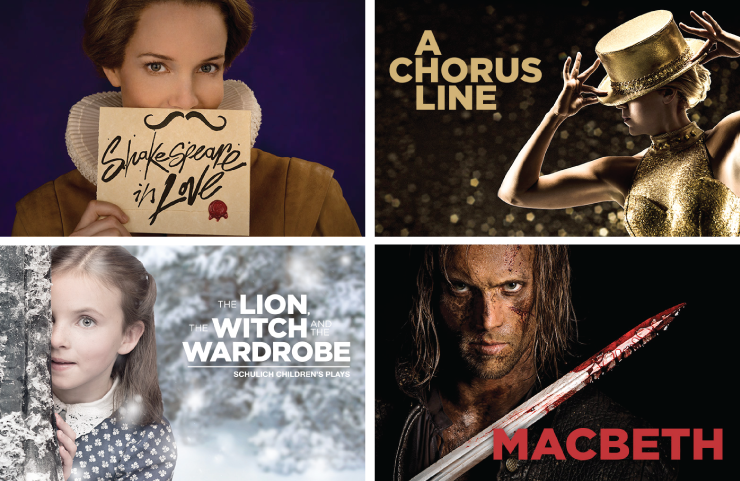
The Stratford Festival, an annual, Canadian theatre festival, is set to begin in April and this year's lineup is typically wide ranging, with 13 plays at four venues.
As always, Shakespeare is the heart of the festival. This year, the Bard is represented with productions of Macbeth, As You Like It and a reworking of Richard II, Henry IV, Part 1 and 2, and Henry V into two plays under the title Breath of Kings. The presentation was conceived and adapted by Stratford veteran Graham Abbey.
Shakespeare, himself, is the lead character in a new stage version of the Oscar-winning film Shakespeare in Love. The comedy sets the young playwright in an Elizabethan setting that is not too different from our own.
The two musicals both have theatrical themes. A Chorus Line is a tribute to modern troupers and Stephen Sondheim's A Little Night Music, an adaptation of Ingmar Bergman's Smiles of a Summer Night, with the hit song "Send in the Clowns."
Every year, Stratford presents a production geared for families. This year it's a stage adaptation of C.S. Lewis's popular fantasy The Lion, the Witch, and the Wardrobe.
Arthur Miller's All My Sons is a modern Shakespearean tragedy of blind betrayal in the story of an airplane manufacturer who cuts corners to save money during World War II.
Other works are Moliere's comedy The Hypochondriac, Henrik Ibsen's John Gabriel Borkman, and the world premiere of two contemporary plays, Aeneid, a modern take on Virgil's epic poem, and a comedy, Bunny.
This is a good year to check out the festival at bargain prices. The value of the Canadian dollar has been falling. Recently the U.S. dollar was worth $1.40 Canadian. That's good news for thrifty theatergoers for tickets, hotel rooms, and restaurants.
The season begins in April and runs through the end of October.
Hugh Gallagher has written theater and film reviews over a 40-year newspaper career and was most recently managing editor of the Observer & Eccentric Newspapers in suburban Detroit.
For more information, check out the Stratford Festival website or call 1-800-567-1600.
Preview: Rosencrantz and Guildenstern are Dead, Ann Arbor Civic Theatre
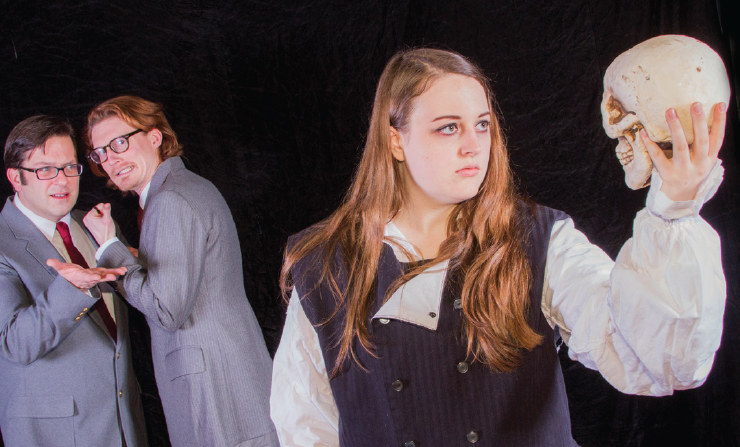
This year marks the 400th anniversary of the death of William Shakespeare.
Ann Arbor Civic Theatre, who began their season with an excellent staging of Julius Caesar, again salutes the famous playwright with a production of Tom Stoppard’s Rosencrantz and Guildenstern are Dead, the masterpiece of tragi-comic absurdity highlighting the misadventures of several characters from Shakespeare’s Hamlet.
Using two of the tragedy’s minor characters, the courtiers Rosencrantz and Guildenstern, as its centerpiece, the play premiered in London in 1967 before becoming a critical hit on Broadway, winning the Tony Award and Drama Critics Circle awards for Best Play. New York Times critic Clive Barnes wrote that the play was “very funny, very brilliant, very chilling” and stated that, “in one bound Mr. Stoppard is asking to be considered as among the finest English-speaking writers of our stage, for this is a work of fascinating distinction.”
Civic Theatre first tackled Rosencrantz and Guildenstern twenty years ago in its 1996-97 season. David Widmayer directs the current production, and, in addition to his fondness for the play and love of absurdist theater, is particularly excited about the original music created for the production and how it fits each character.
Local audiences will recognize veteran actors Isaac Ellis and James Ingagiola who portray Rosencrantz and Guildenstern. Other famous characters include Hamlet (Suzy Culbertson), Horatio (Chris Grimm), Claudius (Greg Kovas), Ophelia (Amanda Photenhauer), Gertrude (Christina Sauer), and Polonius (Elizabeth Wagner). Music direction is by Michael Edwards and the fight sequences are choreographed by Melissa Freilich.
Tim Grimes is manager of Community Relations & Marketing at the Ann Arbor District Library and co-founder of Redbud Productions.
Performances of Rosencrantz and Guildenstern are Dead run Thursday – Sunday, March 10-13 at the University of Michigan’s Arthur Miller Theatre, 1226 Murfin Ave, 48109. Tickets are available online at www.a2ct.org, by calling the office at 734-971-2228, at the A2CT office at 322 W. Ann St., or at the door. Additional information is available by visiting www.a2ct.org.
Preview: The Ark's 29th Annual Storytelling Festival
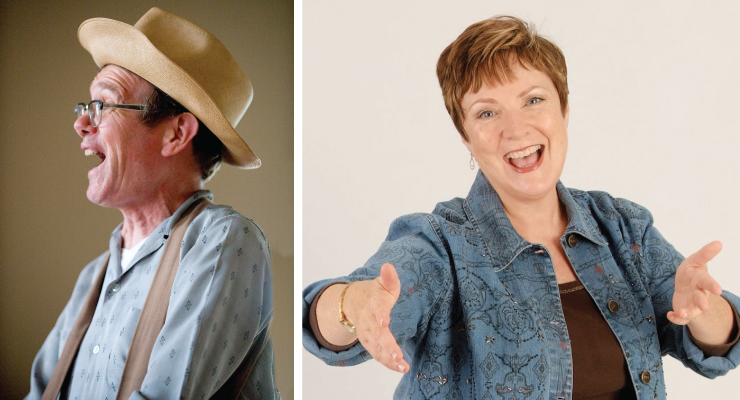
Humankind’s oldest art form is also the basis of one of The Ark’s longest running events. This year marks the 29th Anniversary of The Ark’s Annual Storytelling Festival, a two-night event that brings the oral tradition from the primordial bonfires of yore to The Ark’s warm and welcoming concert hall. Saturday night this year’s featured storytellers will spin yarns geared toward a mature adult audience, and Sunday afternoon they’ll switch gears to entertain an all ages crowd.
Over the years the festival has welcomed a bountiful mix of perspectives and storytelling styles, and this year is no exception. This weekend’s three featured storytellers -- author, playwright, storyteller, and NPR correspondent Kevin Kling; acclaimed musician and children’s entertainer Bill Harley; and local Irish performer Yvonne Healy -- spoke to me about what kinds of stories they will tell each night, and how their work has changed with the rise of radio storytelling shows like The Moth and Snap Judgement.
Headliner Kevin Kling is known for his humorous personal stories about his Midwestern upbringing and his experience with physical disability. Though he has been featured regularly on NPR’s “All Things Considered,” Kling says he prefers performing in front of a live audience.
“Garrison Keillor really put us on the map, and somebody said, I thought very accurately, that he plays a microphone like a Stradivarius,” Kling says of his distinctly Midwestern colleague. “He's so wonderful on the radio. He really has found that medium. I'm a bit different in that I love a live audience. There's something visceral and chemical, something that happens on stage that neither sound waves nor lightwaves can quite fill. That to me is the magic of a live performance. You don't see a lot of standing ovations in front of the radio.”
Kling says he always knew he wanted to be a performer, but early on he had no idea he would get paid to simply stand on stage and talk about his life. He says his professional career as a storyteller began in that most fabled of artistic proving grounds: the dinner party.
“I was in the kitchen at a party, you know that's always the best place, and I was just blabbing away,” he says. “Little did I know there was a theater producer in the kitchen and she said, ‘Do you want to be in our season next year?’ And I said, ‘Doing what?’ And she said, ‘Just what you did in the kitchen.’ Before I knew it, before I knew what I was, I was on stage telling stories in a theater in Minneapolis. And then I went to Seattle, and then off-Broadway, doing pretty much what I did in that kitchen.”
Kling says he doesn’t know exactly which of his two-hundred-plus stories he will tell this weekend. He likes to show up to a venue with a good chunk of his repertoire in mind and read the crowd before deciding where to take the audience for the evening. One topic he is certain he will touch on, though, is disability, something he’s an expert on. Kling was born with a deformed left arm, and he lost the use of his right one after a near-fatal motorcycle accident. Still, he assures us he’ll keep things as light as possible no matter how serious the subject matter he chooses to delve into might be.
“It will be done with humor,” he says. “That's the best way for me to get through that because you can laugh at something that doesn't control you anymore. Everybody in the audience knows loss. People say, ‘What's the difference between stand-up comedy and storytelling? You close a door with a joke with comedy, but with storytelling you open a door with a joke. It's like you're saying, ‘Now that we're all here, let's get to it.’’
Joining Kling on stage this weekend is another nationally renowned storyteller, Bill Harley. Dubbed “The Mark Twain of contemporary children’s music,” Harley pairs wit, humor, and song to embellish tales of his childhood, coming-of-age, and family life.
When asked why he is drawn primarily to telling stories from his youth, Harley responds, “I find that if I talk seriously about childhood, then everybody usually comes along. That's the birthplace of our disaster, so that's pretty fertile territory.”
Harley says he probably won’t tailor the topics of the tales he chooses for the adult and family sessions this weekend, but rather the manner in which he tells them.
“It's not so much structure as it is language, nuance and subtext,” he says. “If you talk about childhood or coming-of-age seriously, those experiences we carry with us through our whole lives, everytime we touch on those experiences it brings up something that touches us, that reaches adults just as much as it does younger kids. Obviously with the family show, I'm less likely do to do a 40-minute story. With a family show you can't mess around. You've got to keep your pedals moving and your foot to the floor and be very aware of what`s going on. With adult performances, there's a lot more nuance, and there's a lot more chance for discovery.”
Harley’s performances will ensure the melodic comfort The Ark typically traffics in won’t be entirely lost for the weekend. He says audiences are often surprised and delighted by the way he flirts with the intersection between song and spoken word.
“When you sing a song, people go, ‘Okay, we know that,’” he says. “And then you put your guitar down or you're holding your guitar and you start to talk, and all of a sudden people are kind of waiting for the talking to end and the music to begin again. And slowly, they realize this is something other. I always have people come up to me and say, ‘I haven't been to something like this for years. I can't remember the last time I sat and listened to something like that.’ It's an amazing experience.”
Local Irish storyteller Yvonne Healy rounds out this weekend’s bill with a rollicking blend of traditional Irish folklore and mythology and flamboyant tales of her own personal experience. Healy, now a resident of Howell, was born in Ireland and raised in the U.S. She says her upbringing straddled the cultural mores and traditions of both countries and gave her a master class in the art of storytelling.
“Inside the house was Ireland, and outside the house was the United States,” she says. “So inside the house we spoke Irish, and we danced Irish dances and sang to Irish music. We behaved in an Irish way, and part of that is learning to tell stories properly, with proper accent and proper detail. I learned by rote, phrase by phrase.”
Healy’s father had a profound influence on her interest in telling stories. She describes him as an alternately charming and argumentative contrarian who could worm his way out of any situation with a good yarn.
“I asked him one time, ‘How is it that you never get beat up?’ And he said, ‘Well I got beat up once. Now, whenever I get to that point, and I like getting them to that point, then I tell them a story and confuse them. And then they let me go.’ So really, talking is a martial art.”
Like this weekend’s other two storytellers, Healy says she doesn’t yet know exactly what stories she’ll bring to the stage. She says Sunday she will stick to traditional folklore and mythology because she believes children, who are are developing their perspective on life, need the neatness of literary devices and literary structure. For Saturday night, she says she will cull stories from her own life. With more and more people being introduced to live storytelling via NPR, she says that seems to be what people want to hear these days.
“I think it’s because we have such an educated populace,” she says. “We can figure out where stories are going to go, but real life is not neat like a fictional story is. Real life is messy and doesn't have those kind of fictional constructs, and so that's very interesting to us. We spend a lot of time alone or with screens in our contemporary society, and I think having deep, real conversations with other people face-to-face is very moving for everybody.”
Healy elaborates on that last remark. Live storytelling, she says, is a conversation between the performer and the audience.
“The story changes depending on how the audience reacts,” she says. “If you're losing some people in some place, you kind of come back and go back into the thread and go off on another digression, but only if the audience is responding to it. A story is really co-created by everybody in the room.”
Steven Sonoras is an Ypsilanti-based freelance writer, and he would love to tell you the story about the time he saw a UFO.
The Ark’s 29th Annual Storytelling Festival runs Saturday at 7:30 p.m. & Sunday, at 1 p.m. The Ark is located at 316 S. Main St. Tickets are on sale now through the Michigan Union Ticket Office and at The Ark's website. Tickets are priced at $20 for the Saturday evening show and $10 for the kids’ show on Sunday afternoon.


































